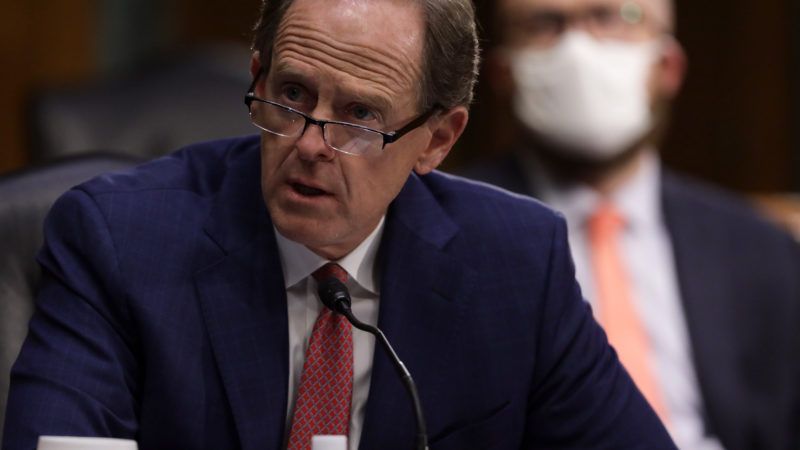Pat Toomey on CDC Eviction Moratorium: 'The Legal Authority Is a Real Stretch'
The Trump administration's new nationwide eviction moratorium provokes a backlash from some congressional Republicans.

The Trump administration's new nationwide moratorium on evictions is attracting heated opposition from some Republicans in Congress, who say it is legally shaky and sets a dangerous precedent for future administrations.
"I think the legal authority is a real stretch," says Sen. Pat Toomey (R–Penn.). "I don't know what the limiting principle is."
The Centers for Disease Control and Prevention (CDC), which issued the moratorium on Tuesday, cites its authority under the Public Health Services Act to issue regulations to stop the interstate spread of disease. That argument doesn't impress Toomey.
"If the CDC has the authority to force landlords to effectively give away their product for free, I don't know where that ends," Toomey tells Reason. "Can General Motors be forced to give people cars unless they otherwise crowd into subways?"
Other congressional Republicans have raised similar concerns. Sen. Rand Paul (R–Ky.) said on Twitter that the "CDC does not have the authority to do this. It's dangerous precedent and bad policy."
"Rental contracts are governed by state law. There is no federal authority to overturn them," tweeted Rep. Thomas Massie (R–Ky.). "The CDC order is an affront to the rule of law, and an emasculation of every legislator in this country—state and federal."
In addition to the legal issues it raises, Toomey argues that the CDC's eviction moratorium is bad policy.
"There's not some mass wave of evictions going on," he argues. "It is in the interest of landlords to work out agreements with tenants going through difficult circumstances." A moratorium on evictions, he suggests, would encourage non-payment of rent and disincentivize deals between tenants and landlords.
According to data from Princeton University's Eviction Lab—which tracks eviction filings in select cities—evictions are currently below historic averages in almost every city, including in places where local and state eviction moratoriums have expired. Thus far, rent payment rates have remained pretty steady during the coronavirus pandemic and are only slightly below where they were last year.
The federal eviction moratorium does nothing to relieve tenants of the responsibility to pay rent, instead only limiting landlords' ability to evict tenants for non-payment. Housing advocates have argued that the moratorium is a half-measure that needs to be coupled with rental assistance to tenants. Not doing so, they argue, will leave renters vulnerable to eviction once months of back rent come do.
A $3.5 trillion relief package passed by the Democrat-controlled House in May included $100 billion in emergency rent relief.
Toomey thinks that assistance to renters isn't warranted given the relief measures that Congress has already enacted, including the $1,200 stimulus checks and the federal $600 unemployment bonus.
"I think we have to ask ourselves how much expansion of the welfare state, how many different layers, how many different programs are we going to do. When is it enough?" the senator says.
Toomey says that he has expressed his concerns about the federal government's eviction moratorium to senior administration officials. A legislative remedy isn't practical, Toomey argues, given that House would never sign off on a bill repealing an eviction moratorium.
Meanwhile, he worries that the effort sets a dangerous precedent.
"What future administration, what future president, certainly what future Democratic president is going to want to be accused of being less generous than Donald Trump?" asks Toomey. "Are we to expect that the standard response of the government to an economic downturn is an eviction moratorium? We've never done that before."
The CDC's eviction moratorium goes into effect Friday.
Rent Free is a weekly newsletter from Christian Britschgi on urbanism and the fight for less regulation, more housing, more property rights, and more freedom in America's cities.

Show Comments (64)